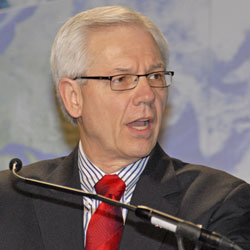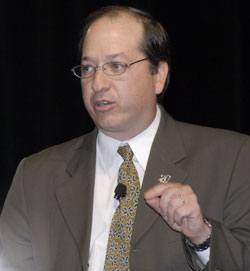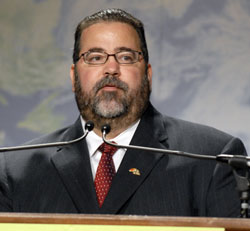 While California leads the nation in alternative fuel stations, pumps offering E85 ethanol and biodiesel are still extremely rare.
While California leads the nation in alternative fuel stations, pumps offering E85 ethanol and biodiesel are still extremely rare.
In fact, this Los Angeles Times story posted on Checkbiotech.org says that out of the 835 alternative fuel stations, 379 offer electricity, 215 pump liquefied petroleum gas, and 174 dispense compressed natural gas… with just a handful offering biodiesel or E85. But that could change:
Now, however, California has adopted ambitious new goals for alternative fuels and cutting greenhouse gas emissions – and it can no longer afford to leave the public out of the mix.For starters, the state is going to increase the use of ethanol as a fuel additive to all gasoline sold here.
For years, California’s gasoline has contained 5.7% ethanol to boost octane and comply with federal emissions rules; starting in 2010, that will rise to 10% ethanol. For a state that consumes about 43 million gallons of gas each day, that change alone represents a huge jump in ethanol consumption.
Meanwhile, biodiesel backers have helped build a statewide roster of more than 50 sites that offer the fuel, with many selling to the public and offering blends ranging from B10 (10% biodiesel and 90% petroleum diesel) to B99, a nearly pure biodiesel fuel.
New state and federal grants will help add E85 sites. In May, the state air board set aside millions to help set up 34 public E85 stations. Most are planned for the Sacramento area, but new sites will also open in the coming weeks in Carlsbad and Oceanside in San Diego County. Separate grants will fund new E85 sites elsewhere later this year.
But getting commercial stations on board might be a little tougher. The article says it costs about $50,000 to add E85 pumps. In addition, the big oil companies, which own most of the commercial outlets, are not warm to allow alternatives to petroleum to be sold at their stations.
GM, which has sold the largest number of the six million E85 vehicles on the road in the country today, is trying to help pump up the use of E85 by underwriting events such as selling E85 for just 85 cents a gallon in an effort to get more people to use the greener fuel.
 Our Undersecretary for Rural Development, Tom Dorr, was first up on the program here this morning at the National Ethanol Conference to speak about the farm bill and focus on renewable fuel policies and provisions.
Our Undersecretary for Rural Development, Tom Dorr, was first up on the program here this morning at the National Ethanol Conference to speak about the farm bill and focus on renewable fuel policies and provisions.

 Florida Power and Light has picked up a $2.5 million state grant to help build a major wind power plant.
Florida Power and Light has picked up a $2.5 million state grant to help build a major wind power plant. While California leads the nation in alternative fuel stations, pumps offering E85 ethanol and biodiesel are still extremely rare.
While California leads the nation in alternative fuel stations, pumps offering E85 ethanol and biodiesel are still extremely rare. Government to Greenpeace will be taking part in the
Government to Greenpeace will be taking part in the  The National Ethanol Conference got a little bit country and a little bit rock and roll tonight and a whole lot of corn fed. I don’t know about you but I love being corn fed and I love
The National Ethanol Conference got a little bit country and a little bit rock and roll tonight and a whole lot of corn fed. I don’t know about you but I love being corn fed and I love  Bob Dinneen, RFA President, isn’t the only one to preach a powerful sermon here at the National Ethanol Conference. I was very surprised and pleased to hear Andy Karsner, Assistant Secretary for Energy Efficiency & Renewable Energy, U.S. Department of Energy, speak at today’s luncheon. He gave a very passionate speech that you would really enjoy listening to. That’s why I decided to post a link to the full speech below for you. I know it’s a little long but you can listen to as little or as much as you’d like this way.
Bob Dinneen, RFA President, isn’t the only one to preach a powerful sermon here at the National Ethanol Conference. I was very surprised and pleased to hear Andy Karsner, Assistant Secretary for Energy Efficiency & Renewable Energy, U.S. Department of Energy, speak at today’s luncheon. He gave a very passionate speech that you would really enjoy listening to. That’s why I decided to post a link to the full speech below for you. I know it’s a little long but you can listen to as little or as much as you’d like this way. The Reverend of Renewable Fuels got up and preached a powerful sermon today on the state of the ethanol industry. Bob Dinneen, President of the Renewable Fuels Association, gave his annual state of the industry speech this morning.
The Reverend of Renewable Fuels got up and preached a powerful sermon today on the state of the ethanol industry. Bob Dinneen, President of the Renewable Fuels Association, gave his annual state of the industry speech this morning. Biofuels will be in the spotlight throughout the conference and the yet-to-be-completed Farm Bill will likely be a major topic of conversation as new agriculture secretary Ed Schafer will address the crowd on Friday during the general session.
Biofuels will be in the spotlight throughout the conference and the yet-to-be-completed Farm Bill will likely be a major topic of conversation as new agriculture secretary Ed Schafer will address the crowd on Friday during the general session. 
 The City of New Orleans will be running the buses that replace the losses from Hurricane Katrina on biodiesel.
The City of New Orleans will be running the buses that replace the losses from Hurricane Katrina on biodiesel. Gadsden, Alabama is getting into the swing of biodiesel… and it’s depending on the community to help fuel the green move.
Gadsden, Alabama is getting into the swing of biodiesel… and it’s depending on the community to help fuel the green move.